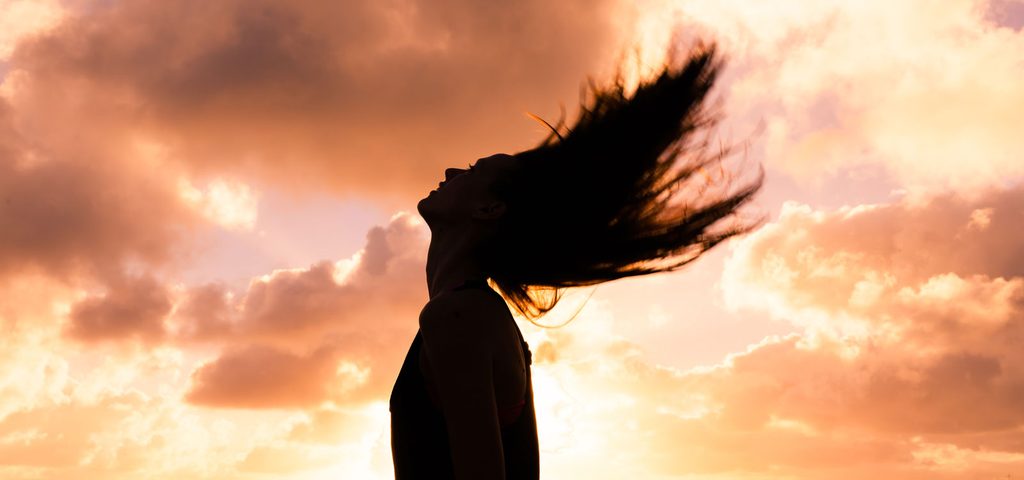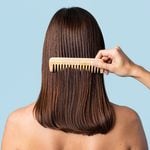The Surprising Ingredient That’s Damaging Your Hair

You might want to look more closely at the ingredient list on your hair products.
How I’d describe my hair? Au naturel. I get regular trims every four months, abstain from hair dye, make time for a weekly hair mask, let my hair air-dry after every wash and avoid hot styling tools. To me, my hair care regime is the epitome of “healthy,” even though I shower pretty much every day. (And yes, I’m aware that it strips away the natural oils from my scalp!) But besides my refusal to use dry shampoo to hide my greasy part, I still had one concern…
Curious as to why I was “taking care” of my hair but still experiencing brittle, damaged and dry strands (mainly on the lower half), I decided to get some professional insight from Natalie James, owner and CEO of Vent Blow Dry Bar, located in Toronto’s Liberty Village. After discussing my hair concern, James suggested “too much protein” in my hair products as being the likely culprit for my seemingly damaged strands. Although protein is a key ingredient for healthy, strong hair, “protein is a bit of a double-edged sword,” says James. “It can strengthen and repair the keratin bonds, helping to give it structure and strength. However, too much protein can have negative effects on the hair – causing it to become brittle and lead to severe breakage.” (Psst: Here’s more tips to help reduce hair breakage this winter.)
How to tell if your products contain protein
“The best way to be alert of protein-rich products is to look for the buzzword listed on the label,” says James. “Basically any product that claims to strengthen, repair, rebuild or restructure your hair indicates that there’s a high concentration of protein ingredients.” Try to keep an eye out for anything that indicates “protein,” in addition to keratin, casein, oat flour, panthenol, cholesterol and collagen.
This can be hard to avoid, since many hair care products contain some form of protein. That’s why James advises you check the ingredient placement on the label. “Some products will list ingredients from top to bottom, with the highest concentrations being at the top of the list,” she says. If a protein-rich ingredient is listed at the bottom, there likely isn’t much of a concentration in it to be concerned about. But if the product label lists its ingredients alphabetically, that’s when things start to get tricky because there is no way of truly knowing what the primary ingredients are.
Does protein affect different hair types?
No. “All human hair is the same at the cellular level, regardless of colour and textures,” says James. The difference lies in our hair’s porosity, which simply refers to the hair’s ability to hold and absorb moisture. “Low porosity hair is resistant to moisture and is typically protein-sensitive, meanwhile those with high porosity hair do not have sufficient protein in their hair,” she says. “Oftentimes, hair that is very porous is a result of damage from chemical and colour treatments, everyday styling, weather and pollution, so adding protein is highly recommended.”
As for natural hair that is unprocessed, but is still exposed to environmental elements and styling tends to have more sufficient levels of protein. In this case, “the use of products containing added protein can actually end up causing unnecessary damage,” says James.
Is your hair getting too much protein?
To find out if you have protein-sensitive hair, James suggests removing all protein-rich products from your hair care regime for a period of three to four months. Then, test one of those products on a section of your hair. “If your hair becomes noticeably dry and brittle, you’re likely protein-sensitive,” she explains. Just remember that regaining your hair’s moisture/protein balance doesn’t happen overnight; it can take anywhere from four to six months. James recommends you start by adding a clarifying shampoo to your hair regime: “It will strip off any buildup on the hair; buildup that will prevent moisture from penetrating the hair.”
But along with the possibility of having protein sensitive hair, your diet could also be at fault. “Hair requires more than protein to be strong and healthy,” says James. “Incorporating vital nutrients, like iron, vitamin C, niacin, biotin and zinc, helps hair to grow long and remain strong.” It’s important to be mindful of when our bodies are deficient in essential nutrients, as it reveals in our hair first.
Next, learn the everyday mistakes that are aging your hair.




